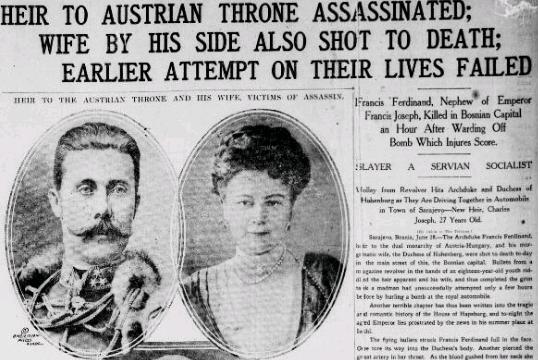A hundred years ago, on June 28, 1914, Archduke Franz Ferdinand and his consort were assasinated in Sarajevo, Bosnia, as reported here in the next day’s edition of the New York Tribune.
That morning, as the heir to the Austro-Hungarian throne made his way to city hall, a bomb had been thrown at his entourage. The papers reported that he was indignant upon his arrival at city hall, and snapped, “Herr burgemaster, we come to pay you a visit and bombs are thrown at us. It is an insult!”
After the ceremonies had been concluded at city hall, the Archduke and Duchess announced that they would go to the hospital to visit the wounded members of their party. Despite being under the protection of a cordon of police, they made a wrong turn down a street where the young Gavrilo Princip seized the opportunity and fired the fatal shots upon the Archduke and Duchess.
Later reports, such as the Washington Times for July 1, 1914, revealed that scores of bombs had been awaiting the royals, and that the Archduke “had not one chance in a hundred to escape the Bosnian conspirators.” The Times also correctly reported that “war is near.”
The assassination did indeed serve as the spark that ignited the First World War. Austria-Hungary had annexed Bosnia in 1908. While residents of Vienna paid surprisingly little attention to the assassination, it did spark a massive crackdown against Serbs in Sarajevo, as well as massive riots. The evening of the assassination, the mayor of Sarajevo issued a proclamation denouncing the crime, and announcing that there was no doubt that the bomb came from Belgrade. Anti-Serbian protests, as well as a virtual pogrom against the Serbs, followed.
Austria-Hungary also assumed (correctly, it turns out) that Serbia had been responsible for the assassination, and delivered an ultimatum to Serbia. When Serbia failed to comply, Austria-Hungary declared war on July 28. Russia and Germany quickly mobilized their forces, and in response, Germany delivered an ultimatum to Russia to demobilize. When this ultimatum went unheeded, Germany then declared war against Russia on August 1. When France did not adequately comply with German demands for neutrality, Germany declared war on France on August 3, followed by a declaration of war against Belgium on August 4. In response, Britain declared war against Germany on August 4.
Wireless and other technologies were to play an important role in the course of that war, and we’ll be seeing many such examples here as we look back at the centennial of the Great War. The various ultimata and declarations seem to have been delivered successfully using normal diplomatic channels, and wireless seems to have played little role in the start of the war.
It is interesting to note, however, how Austria-Hungary had used technology as part of its unsuccessful attempt to incorporate Bosnia into its empire. The journal Electrical Engineering, January, 1914, reports the successful completion of the Vienna-Sarajevo telephone circuit: “Satisfactory telephonic communication has recently been established between Vienna and Sarajevo, a distance of 875 miles.” Presumably, that line was cut in the coming months, and one press account notes that in reaction to the assassination, all telephone and telegraph facilities in Sarajevo were shut off to all but official communications.
The world would soon be at war, and wireless was to play a role.


Pingback: The Austrian Ultimatum, 1914 | OneTubeRadio.com